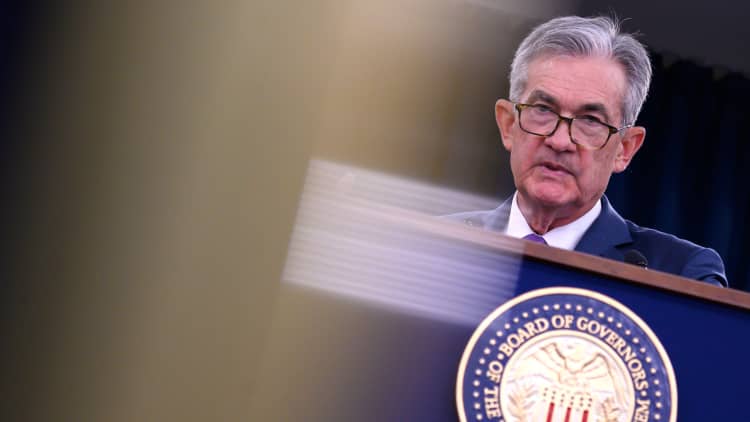
Trade talks and a Fed frenzy.
Those were the two driving narratives for the stock market on Friday as the major averages fell on further escalation in the U.S.-China trade dispute and somewhat cautionary words from Federal Reserve Chairman Jerome Powell that suggested higher odds for future interest rate cuts.
In some ways, experts felt Wall Street was left at the mercy of Washington as uncertainty around tariffs and monetary policy remained yet unresolved.
Here's what three of them had to say as stocks fell:
Moody's Analytics chief economist Mark Zandi liked how Powell handled the Fed's precarious position:
"I think Chair Powell threaded the needle quite well. He gave investors what they needed to hear. Markets are fully pricing in two, maybe three more rate cuts this year, and after the speech, they still think two or three more rate cuts, so I think he got that just right. And he didn't front-run the rest of the [Federal Open Market Committee]. There's a lot of disparate views, as we've been hearing over the past couple of days, about what policy should be like going forward, and I don't think he got ahead of that to any significant degree. So, I think he got it just right. ... My view is this trade war, the president's trade war, is doing significant economic damage. It's clearer overseas. [The] European economy is already arguably in recession. The Asian economy is really struggling. China would be doing a lot worse, except they have the ability to use a lot of stimulus, monetary and fiscal stimulus. And now, in the U.S., we're feeling it. I mean, you saw yesterday's numbers on manufacturing. Manufacturing is in recession. We saw some big downward revisions to employment growth across the board, lots of different industries. So, the economy's, I think, weakening. So, I do think that we need to see more rate cuts here, and two or three seems logical at this point, but, as Chair Powell pointed out, there's no playbook here. Hard to know what the president's going to do. He could end this tomorrow with a tweet, so they've got to be reactive."
Jason Furman, former chair of the Council of Economic Advisers, was also in favor of Powell's statements but highlighted just how much uncertainty persisted in global markets:
"Jay Powell gave a terrific speech. He talked more clearly about the risks that trade policy is posing to the U.S. economy than he ever has before. He was clear that he was going to look through the noise and look at the longer term in terms of how he's setting U.S. monetary policy. And he certainly didn't tell us what he was doing next on rates because I don't think he knows what he's doing next on rates. He's going to see what goes on in the world, what goes on in the U.S., what goes on in the data and make a decision based on those facts, not on some preconceived theory. ... The economy's always really hard to predict, and so you need to be ready for contingencies, but a lot of the global economy hinges now on the decisions of a few people, one of them being President Donald Trump. And I certainly lay no claim to expertise in predicting what his next set of actions are going to be."
Gita Gopinath, economic counselor and director of the research department at the International Monetary Fund, was focused on the downside risks:
"Global growth is subdued, and we describe it as fragile. There are many downside risks, and one of the risks that we keep flagging is risks on the trade front, the uncertainty surrounding it. And the developments that we're seeing, as recently as today, give us grave concern about what's going to happen to growth going forward. ... Trade is indeed showing a lot of weakness. We're seeing a lot of weakness in industrial production and manufacturing. But on the other hand, if you look at services, services is still holding up, though not as brightly as it was at the start of this year. So, I think it's a mixed bag of signals. On the one hand, you're seeing huge demand for safe assets, which is what you typically see before a recession. Equity markets are volatile, but they're still high, so it's mixed around the world."






